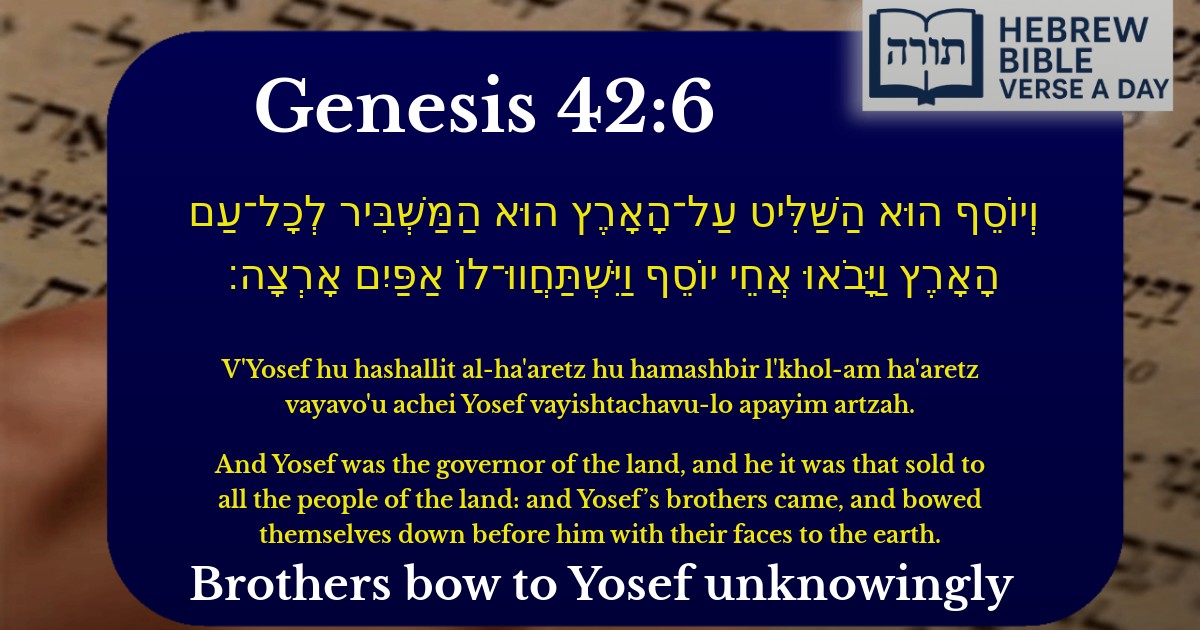Join Our Newsletter To Be Informed When New Videos Are Posted
Join the thousands of fellow Studends who rely on our videos to learn how to read the bible in Hebrew for free!
Hebrew Text
וְיוֹסֵף הוּא הַשַּׁלִּיט עַל־הָאָרֶץ הוּא הַמַּשְׁבִּיר לְכָל־עַם הָאָרֶץ וַיָּבֹאוּ אֲחֵי יוֹסֵף וַיִּשְׁתַּחֲווּ־לוֹ אַפַּיִם אָרְצָה׃
English Translation
And Yosef was the governor of the land, and he it was that sold to all the people of the land: and Yosef’s brothers came, and bowed themselves down before him with their faces to the earth.
Transliteration
V'Yosef hu hashallit al-ha'aretz hu hamashbir l'khol-am ha'aretz vayavo'u achei Yosef vayishtachavu-lo apayim artzah.
Hebrew Leining Text
וְיוֹסֵ֗ף ה֚וּא הַשַּׁלִּ֣יט עַל־הָאָ֔רֶץ ה֥וּא הַמַּשְׁבִּ֖יר לְכׇל־עַ֣ם הָאָ֑רֶץ וַיָּבֹ֙אוּ֙ אֲחֵ֣י יוֹסֵ֔ף וַיִּשְׁתַּֽחֲווּ־ל֥וֹ אַפַּ֖יִם אָֽרְצָה׃
וְיוֹסֵ֗ף ה֚וּא הַשַּׁלִּ֣יט עַל־הָאָ֔רֶץ ה֥וּא הַמַּשְׁבִּ֖יר לְכׇל־עַ֣ם הָאָ֑רֶץ וַיָּבֹ֙אוּ֙ אֲחֵ֣י יוֹסֵ֔ף וַיִּשְׁתַּֽחֲווּ־ל֥וֹ אַפַּ֖יִם אָֽרְצָה׃
🎵 Listen to leining
Parasha Commentary
📚 Talmud Citations
This verse is quoted in the Talmud.
📖 Chullin 91a
The verse is referenced in a discussion about the humility of Joseph's brothers when they bowed before him, illustrating the fulfillment of Joseph's earlier dreams.


Yosef's Leadership and His Brothers' Bowing
The verse states, "And Yosef was the governor of the land, and he it was that sold to all the people of the land". Rashi (Bereshit 42:6) explains that Yosef was not merely a governor but the sole authority over food distribution during the famine, emphasizing his complete control. The Ramban (Bereshit 42:6) adds that this underscores Divine Providence—Yosef's rise to power was part of Hashem's plan to sustain the world and ultimately reunite his family.
The Fulfillment of Yosef's Dreams
The phrase "and Yosef’s brothers came, and bowed themselves down before him with their faces to the earth" directly fulfills Yosef's earlier dreams (Bereshit 37:5-11). The Midrash (Bereshit Rabbah 91:7) notes that this bowing was not just physical but symbolic of their submission, marking the beginning of their repentance for selling him. The Sforno (Bereshit 42:6) highlights that their bowing apayim artzah (with faces to the earth) demonstrated complete humility, acknowledging Yosef's elevated status.
Yosef's Role as Sustainer
The Brothers' Journey to Reconciliation
The act of bowing also initiates the process of teshuvah (repentance) for the brothers. The Netziv (Ha'amek Davar, Bereshit 42:6) explains that their prostration was the first step in rectifying their sin, as true repentance requires confronting the consequences of one's actions. This moment sets the stage for their eventual reconciliation with Yosef and their spiritual growth.